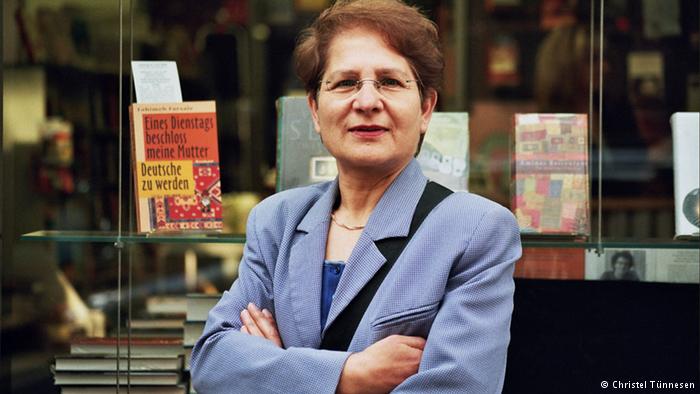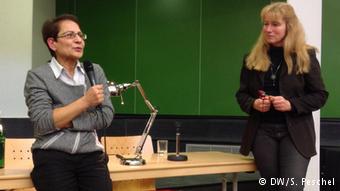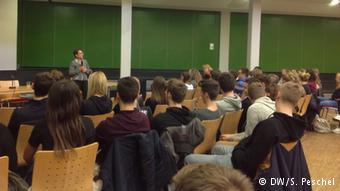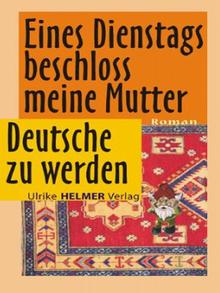Books
Flight and Integration: the encounter with the writer Fahimeh Farsaie
The Iranian-German writer Fahimeh Farsaie writes in her novel, “A Tuesday decided my mother is German to be” humorous about your escape. Your Tricks, it now has the German students explained.

“I want to be German,” declared Sima one on a Tuesday night at the dinner table in their Cologne apartment. And because you as a mother in her Iranian family has the Say, going to the Azads in addition to Kebab also sausages and mustard on the table as the spouse of his Persian Patriotic sense of honor, yet so very much in the Gegenwaagschale throw.
Fahimeh Farsaie is with her already in 2006 published novel “One Tuesday decided my mother is German to be” a guest in the Albert-Schweitzer-Gymnasium in Hürth, a small town near Cologne. It is Friday afternoon, the last lesson before the pupils of the higher classes for the weekend are to be released. About 70 young people between the ages of 16 and 18 in the auditorium gathered. Follow closely the reading of excerpts from Farsaies book, the after its Appearance nearly ten years ago as the first “Einbürgerungsroman” Germany has been recognised.
Autoreninitiative on the topic of escape

Teacher Martina Zöllner (r.) has Fahimeh Farsaie at your school invited
Flight and Integration, the topics are to it this afternoon. The 1952-born Iranian author reads not for the first Time in front of students. A few days before that, she was already in the Cologne European school; in total it is in their role as a mediator between worlds eight Times before school classes. Fahimeh Farsaie is the first author, which is an Initiative of the children’s Fund (UNICEF follows. Miriam Brose, head of the organizational person responsible UNICEF-Hochschulgruppe Cologne, highlights the voluntary commitment of the writer in this pilot project. Other in North Rhine-Westphalia, and later in other States to follow: writers who go into schools to meet with their texts and in conversation with young people understanding of the Situation of refugees and to promote.
Commitment for the rights of dissidents
Fahimeh Farsaie is a trained lawyer, but her interest in things, to observe and to tell, early on the author and a journalist. It is not initially to your advantage: for 18 months, she sat under the Shah’s Regime because of the release of a love story in Iran in prison. “The publication of a story against the war, in which it is superficially about love, it was the reason for my arrest,” reports the writer.

After 14 years in exile speaks Khomeini on 1. February 1979 in Tehran, in front of his followers
As the Shah’s Regime in 1979 by the Ayatollah Khomeini was replaced, enthused Farsaie for the Revolution and hoped for democratic developments in Iran. From London, where she works as a correspondent for the major Iranian daily newspaper “Keyhan” worked, she returned to Iran back in order to adapt to the new movement to participate. “I wrote articles in which I am for freedom of expression and the rights of dissidents began,” says the author. “At the very beginning we did not know what Khomeini’s ‘Islamic Revolution’ and the ‘Islamic Republic’ even meant. But at that time I quite for this Republic voted for a Republic, the ‘Islamic’ in the name of deception.”
Then, as now: Fluchtursache war
But that was a mistake, because the bondage was under the new Regime will only grow. The revolutionary guard has exercised a strict rule, and the young Fahimeh Farsaie threatened to re-arrest. In 1983, fled the author prior to the Khomeini Regime. And just as you escape the characters in your book against political repression, against the censorship, the threat of arrest and imprisonment, and particularly before the war.

Fahimeh Farsaie in conversation with students of the Albert-Schweitzer-gymnasium in Hürth
The novel, from the this Friday is read aloud, is strongly autobiographical. Much that he describes, has its author’s own experience. “Like the people of today also fled at that time we were before the war,” said Farsaie, “the war between Iran and Iraq.” Some passages of her book, signs of the bombing in the memory of the fleeing girl. He describes the escape through the desert, on the you like cattle to be transported, and almost in a burning sandstorm perish. Still laughing, the students again and again, because the book is with a lot of Humor written in a friendly Satire. A heavy theme, easy to make, this is the Trick to reaching a wide audience, reveals the author.
Parallels to the present day
“The uncertainty and great fear” that both connects the Situation of the refugees of that time with the present. “That one is defenseless, feels and seemingly not regarded as humans.” The refugees, who today come to Germany, advises Farsaie, especially to learn the language in order to access to the German society to find, as quickly as possible to integrate.
More than for General questions about UNICEF to the subject “refugees” are the students at your personal fate after your arrival in Germany interested. “I actually have other questions, expect more to the current Situation”, writes the author in the review. “The pupils have very for my imprisonment are interested in. That could mean that the background of the escape more interesting than the connection to the present.”

What you then have desired, asks a student. “I have desired, as a normal human being to be treated,” says Fahimeh Farsaie. An answer that is quite the bridge to the present day hits.
Fahimeh Farsai has in German a total of five novels and Erzählbände published. “One Tuesday decided my mother is German,” was published in 2006 by Ulrike Helmer Verlag, 2011, Kindle Edition. This spring will be the book based on its latest up-to-dateness wiederaufgelegt.
